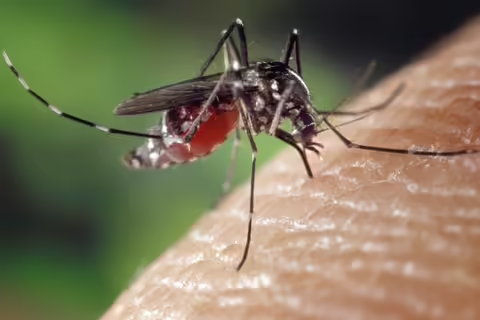BLOOMINGTON, IL – It's mosquito season in Illinois, and University of Illinois Extension has practical ways to keep you from being a victim.
Adult mosquitoes eat nectar, pollen, and honeydew (insect droppings full of sugar). Female mosquitoes need the protein in human blood to produce eggs, says Kelly Allsup, Extension horticulture educator. As they bite, mosquitoes inject saliva that thins the blood and numbs the area. Mosquito saliva causes humans to produce histamine that swells and becomes itchy.
Prevention begins by removing potential breeding habitats, including stagnant water. "As little as a half an inch of standing water can be the ideal breeding habitat," Allsup says. "Anything that can hold water should be cleaned and emptied every week."
In rain barrels, homeowners can use mosquito dunks containing Bacillus thuringiensis israelensis (Bti) to control the larvae. "Place screens over water intake holes to prevent mosquitoes from getting in," says Ken Johnson, Extension horticulture educator.
Gutters are another spot for potential mosquito breeding. "Some mosquitoes breed in stagnant, even putrid, water, so cleaning gutters is one of the best things a homeowner can do, Allsup says. Small backyard pools should be emptied and cleaned weekly. Mosquitoes aren't attracted to the light of bug zappers, so Allsup recommends saving your money.
"Citronella candles can be somewhat effective if used in large numbers on calm days," Allsup says. "Citronella-scented geranium plants and other mosquito repelling plants, are not effective because the essential oils of the leaves are not released into the air."
Cities may spray to control adult mosquitoes throughout the state, but chemical rates used to kill mosquitoes are low and most likely will not have a negative impact on other insects.
Here are things one may do to avoid being bitten:
- Wear light-colored clothes, long-sleeved shirts, and long pants, when possible. Mosquitoes are attracted to dark objects.
- Avoid being outside when mosquitoes are active, around twilight or just after it becomes dark.
- Use personal insect repellents. The Illinois Department of Public Health recommends DEET as the most effective chemical to use to combat mosquitoes. Products containing 40% DEET can be effective up to six hours. DEET works by affecting the females’ ability to detect carbon dioxide, heat, moisture, and human sweat. This product should be sprayed liberally on skin. A 10% product can be used for protection on children and will last about two hours. Be sure to apply after sunscreen as part of your summer routine.
- The CDC also recommends products containing Picaridin, IR3535, Oil of lemon eucalyptus (OLE), Para-menthane-diol (PMD), and 2-undecanone. Do not use products containing OLE or PMD on children under 3 years of age.
- Make sure window screens are in good shape to prevent mosquitoes from invading the home.
- Since mosquitoes can't fly against wind current, one may sit in front of an oscillating fan.
SOURCE: Kelly Allsup, Horticulture Educator, Illinois Extension
ABOUT EXTENSION: Illinois Extension leads public outreach for University of Illinois by translating research into action plans that allow Illinois families, businesses, and community leaders to solve problems, make informed decisions, and adapt to changes and opportunities.
